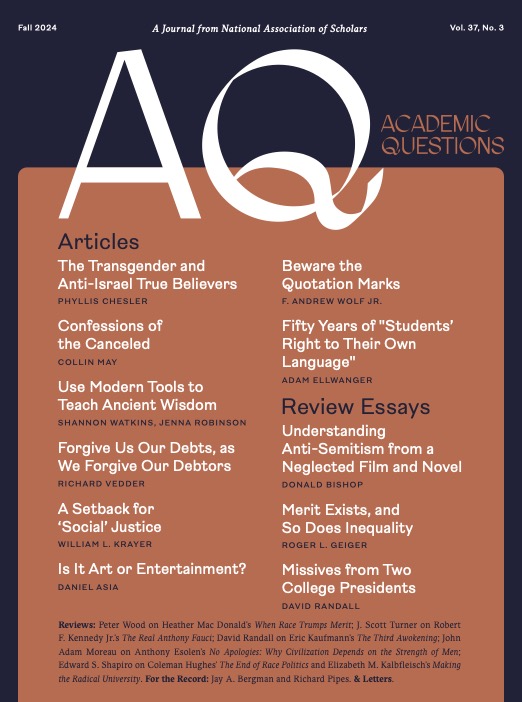When Race Trumps Merit: How the Pursuit of Equity Sacrifices Excellence, Destroys Beauty, and Threatens Lives, Heather Mac Donald, DW Books, 2023, pp. 320, $20.00 hardcover.
Heather Mac Donald is a prolific essayist who has spent much of her career at the Manhattan Institute. In The War on Cops (2016) and The Diversity Delusion (2018) she helped to shape public opinion on these pivotal issues. Her newest book, When Race Trumps Merit, further develops her established themes. The Diversity Delusion focused on the university. The War on Cops dealt with the virulent hatred of law enforcement unleashed by Black Lives Matter. When Race Trumps Merit treats diversity mania in three sections: “Science and Medicine,” “Culture and Arts,” and “Law and Order.”
MacDonald’s forte is documenting how epidemic ideas play out in real life. Indeed, her first book, published almost 25 years ago, was titled, The Burden of Bad Ideas: How Modern Intellectuals Misshape Our Society, and she hasn’t moved far from that concept. The opening chapters of her new work show us in exacting detail how physicians eagerly swallowed the poison that American society is rotten to the core with racism and that they, the doctors and the institutions where they work, could stage a heroic intervention. That story opens, of course, with the death of the career criminal George Floyd in police custody on May 25, 2020. From there she moves to ensuing social hysteria whereby “routine complaints of employees in nearly every workplace are converted into unfalsifiable proof of discrimination when articulated by a particular group of employees.”
That phenomenon is irksome enough in ordinary places of employment. It launched new forms of racial discrimination in Big Tech, banking, and food companies. Mac Donald pauses on these examples just long enough to observe that “underrepresentation of blacks in many professions is the result of the unequal distribution of skills, not of bias.” And the problem of “not enough black STEM PhDs to go around” cannot be solved by instantly admitting more black students to “the pipeline.”
Probably if forced to look squarely at that problem, most people would agree that collapsing the standards of admission in any field would not cure “underrepresentation.” But Americans seem eager not to look squarely at the problem. Rather, we would like to “reject the notion of accomplishment itself.” We do this by conjuring stories to the effect that “accomplishment” (or merit, talent, or whatever else we might choose to call it) is merely a social artifact and has for far too long served the interests of a dominant white population determined to hoard the best-paying and most prestigious jobs for itself.
That idea that the selfishness of white folks explains—and explains away—such “underrepresentation” has become the key talking point of the American left in the last twenty years. It is hard to find any social commentary that does not either allege that “white privilege” is the motor that drives the whole social order and guards the gates of elite institutions, or that ties itself in knots attempting to refute that allegation.
Mac Donald does the only sensible thing. She observes that this theory of bias has put itself on a pedestal above any concern for evidence or accuracy and grants itself immunity from rational criticism as well. How can one argue with someone who claims that the very act of arguing is proof of invidious bias? One can’t. And thus, MacDonald sticks with the audience who at least claims to reach important decisions by following the facts.
When that audience consists of highly credentialed medical professionals, however, we suddenly find ourselves in a bizarre place. It is a place where people ostentatiously pride themselves on their adherence to “fact-based medicine,” while simultaneously engaging in fantasy and wish-fulfillment. Mac Donald patiently walks us through dozens of examples of “anti-racist” training programs that have displaced genuine instruction in medicine. Grand rounds have given way to baubles such as Stanford School of Medicine’s “Creating Native American Pathways to Diversify the Healthcare Workforce to Address Health Inequities.”
Mac Donald takes the trouble to trace what might be better called “guilt-based medicine” through student recruitment, the curriculum, forms of instruction, testing, faculty appointment, funding, accreditation, and research. The reader cannot finish these chapters without weighing the possibility that, when faced with illness, we should make a wide berth around any physician trained in an American school of medicine since 2020. No doubt there are exceptions but given the weight of institutional insistence on the medical priority of diversity, equity, and inclusion concerns, even the exceptional doctor is bound to have suffered important gaps in training as well as active mis-training.
These opening chapters of When Race Trumps Merit might put off some readers, who will wonder whether medicine can have forsaken its moral and intellectual foundations so quickly. Then they will reflect on the complicity of hospitals, medical associations, and doctors with the deceptions of the Covid debacle and say, “Well, maybe.” Some readers, however, will come to the book already aware of how deeply compromised medicine has become by leftist ideology and what I’ll call “panic-ism.” Covid hysteria devoured the general American population, but it became an altar among physicians and hospital administrators. They, of course, could see first-hand the devastation wrought by the disease in its earliest most virulent form, especially when patients were denied plausible interventions and often attached to ventilators that seem in many cases to have hastened death.
Nowhere was resistance to alternative treatments higher than in the medical establishment and nowhere were well-grounded epidemiological studies more quickly dismissed than by medical authorities. Gradually it has become clear that masking, “social distancing,” and vaccinating low-risk populations were colossal errors. Mac Donald’s book doesn’t touch these matters except to note that such medical over-protection and fake-protection fell by the wayside the moment that George Floyd and Black Lives Matters protesters showed up. It was at that point that we learned that protesting racism was a “public health” necessity that outranked any concern for the COVID virus.
The bulk of When Race Trumps Merit, however, is not about medicine, but art. Mac Donald devotes ten chapters on the role of anti-meritocratic racial manipulations to classical music, opera, and art museums. If her medical chapters make us fear for our bodies, her art and culture chapters make us fear for our souls. Mostly because NAS does a lot of work on what is happening in medical schools, nothing much in that section of the book took me by surprise, but chapters on the arts were a non-stop revelation of how highbrow cultural endeavors have abased themselves. In “The Crusade Against Classical Music,” Mac Donald takes us through case after case of symphony orchestras convicting themselves of “racism: for not hiring enough black performers, and not commissioning enough works by black composers.”
In “Scapegoats and the Rise of Mediocrity,” Mac Donald tracks the anti-racism crusade through opera, music theory, and the classical composers now deemed acceptable. In “Making Beethoven Woke,” Mac Donald observes the substitution of multicultural vapidity for Schiller’s lyrics in Beethoven’s Ode to Joy, which in one of the new versions declares:
Positive vibes for an ode to joy!
Rise, oh rise, be the voice of change,
We must show more empathy.
In subsequent chapters, Mac Donald asks, “Can Opera Survive the Culture Wars?” observes, “The Revolution Comes to Julliard,” laments “The Demise of the Docent,” (too many white women!), and catches the directors of art museums cancelling art because it is the product of a white civilization whose only proper role is cringing self-denunciation.
I wish I could say there is something entertaining in this litany of disasters, but such heaping up of cowardly incompetence on top of miserable self-delusion is exhausting. Is it Mac Donald’s aim to disillusion us or to demoralize us? Disillusion comes easily. We all have seen or heard mediocrity paraded in places once reserved for high achievement.
Demoralization, however, comes with the realization that the spirit of artistic excellence is itself at risk. That may be the end-stage of modernism or post-modernism, but it has been exacerbated by the new race hustle. In this development, indifference to excellence mixes with the enthusiasm for moral preening that comes from hiring, commissioning, performing, or displaying work by artists who happen to be black.
In the concluding chapters of When Race Trumps Merit, Mac Donald revisits The War on Cops with the addition of even more dire statistics and examples. She writes here with the George Floyd riots and the “defund the police” movement in plain sight. But the basic picture remains the same. Black Americans commit a hugely disproportionate amount of crime, including murder and other violent crime. “A police officer is about 400 times as likely to be killed by a black suspect as an unarmed black is to be killed by a police officer.” But I shall leave it at that. Mayhem is not, or not yet, an academic question. Saving our civilization, however, definitely is.
Photo by Louis Hansel on Unsplash














